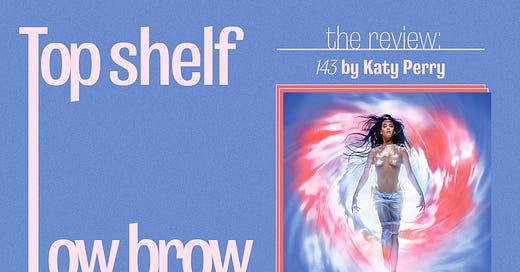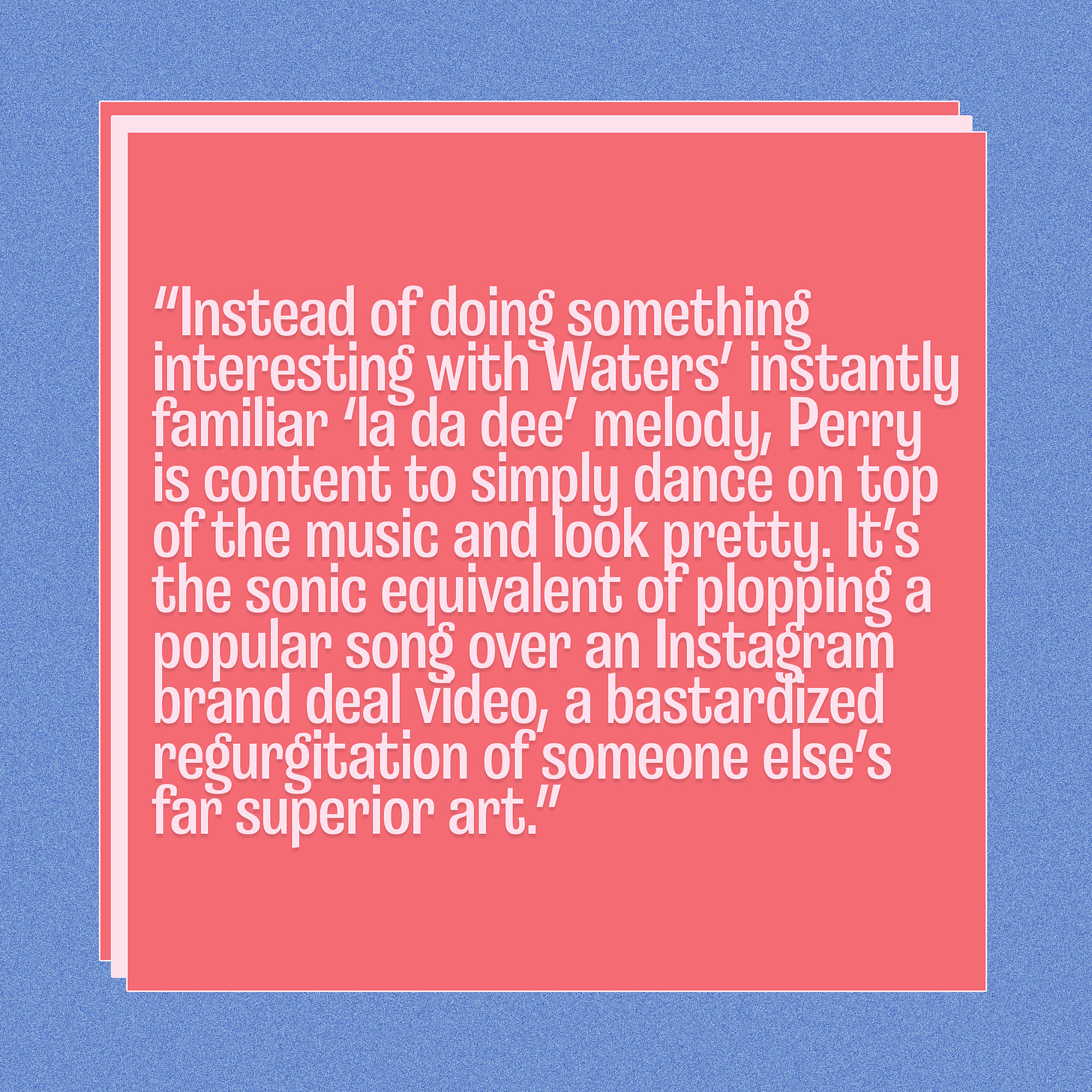The Review: Katy Perry’s ‘143’ Finds a Pop Star in Free Fall
Perry's lifeless sixth studio album is not so much an artistic vision as it is a musical product, the output of someone who thinks persistence is the same thing as resilience.
Welcome back to Top Shelf, Low Brow. This is The Review, a regular edition that looks closer at movies, music, and television. This time, it’s Katy Perry’s 143, a miscellany of pedestrian production and rudimentary ideas that aren’t even bad enough to be provactive.
In the summer of 2004, MTV began airing its latest series, The Ashlee Simpson Show. The reality show trailed Simpson as she prepared to release her first album, Autobiography, a rock-tinged pop record with enough hard edges and allusions to sex and youthful defiance that it would firmly separate Simpson from her older and more successful sister, Jessica. In the show’s first season, the younger Simpson—barely 19 at the time—whined and griped enough during filming that her on-camera behavior became as much a subject of discussion as her music.
That same summer, the envelope-pushing Comedy Central sketch show MADtv aired a parody of The Ashlee Simpson Show, reducing Simpson to a cranky, petulant child, on par with how most people view modern nepo babies. MADtv regular Nicole Parker amplified Simpson’s airhead qualities while brilliantly walking the line between a straight mockery of her subject and a more sympathetic portrayal of a teenager grappling with her pushy stage parents. In one staged confessional, Parker’s Ashlee Simpson is asked about her favorite part of this burgeoning pop career. “The best thing about being a product—” Parker says before putting her palm to her head and sticking out her tongue, “I mean, pfft, an artist—is picking totally cute pictures for my album cover.”
Listening to Katy Perry’s sixth studio album, 143, which is out today, I couldn’t help but recall Parker’s ditzy delivery. In her latest work, Perry ditches the dismal yet intriguing poptronica of 2017’s Witness and the watered-down, gung-ho pollyanna of its 2020 follow-up Smile, walking away from the last vestiges of her art to sit comfortably as a product. 143 is packed with hollow synths and drivelous, half-baked lyrical ideas, neither of which align with the euphoria Perry has ascribed to the album in interviews leading up to its release. The album cover presents Perry floating in a colorful swirl of intergalactic ecstasy. But listening to the songs, this photo looks more like Perry basking in her last moments before free-falling into the abyss. With each track, we check in with Perry during her descent, growing queasy when we’re left to remember her fate in the album’s frequent moments of dead air. It’s a ghastly thing to witness, and even worse to listen to as the sluggish 143 drags a once-prominent artist to the nadir of her career.
143 is named for the numeric code for “I love you,” popularized in the 1990s when pagers were still the prominent mode of quick digital communication. It’s painfully ironic that most of the music within the album sounds just as dated. The album’s third single, “I’m His, He’s Mine,” features a sample of Crystal Waters’ 1991 hit “Gypsy Woman,” a song so great that just biting it automatically elevates Perry’s track to one of 143’s few highlights. But instead of doing something interesting with Waters’ instantly familiar “la da dee” melody—like, say, Lady Gaga did with the vocal modulations of Diana Ross’ “It’s My House” on Chromatica cut “Replay”—Perry is content to simply dance on top of the music and look pretty. It’s the sonic equivalent of plopping a popular song over an Instagram brand deal video, a bastardized regurgitation of someone else’s far superior art.
When she’s not penning obsolete pop songs, Perry is happy to settle for the formulaic. Early on in 143, the Kim Petras collaboration “Gorgeous” begins with some promise. Both women remind us that they share the same initials by taking turns shouting a flirty “K.P.!” into the song before they collide with a clunky chorus. Petras’ verse switches up the song’s existing rhythm, but follows the same bratty rap melodic structure as her verse on Sam Smith’s “Unholy.” Stan Twitter would call that Katy Perry wanting some of Sam Smith’s nachos, but that would require an understanding of the ever-changing colloquial phrase of the month, and Perry doesn’t seem keen on evolving with the times as it is.
143 is a formal regression for Perry. For 10 of the album's 11 tracks, Perry enlists longtime collaborator Dr. Luke, whom she paused her working relationship with while Luke was caught up in litigation after Kesha accused the producer of sexual, emotional, and physical harassment in 2014. A good chunk of Perry’s early hits had Dr. Luke’s touch, but her excitement to work alongside him again doesn’t suggest enthusiasm for a fruitful working relationship so much as it does Perry’s desperation to return to her golden days in the early aughts. Luke’s production lacks the magic it had back then; pop music has progressed far past the sonic boundaries it held from 2010 to 2013 when Perry and Luke were at their mutual peak, and the producer has been reluctant to play catch-up, hoping instead for a return to the rudimentary (if catchy) sound he pioneered.
When asked about her decision to team up with Luke during an interview on Alex Cooper’s Call Her Daddy podcast, Perry said, “He was one of the people to help facilitate [my metamorphosis], and I am speaking from my own experience.” If that wasn’t enough of a non-answer, Perry continued to dance around Cooper’s question. “When I speak about ‘Woman’s World,’ I speak about feeling so empowered now as a mother, as a woman, giving birth, creating life, creating another set of organs—I did it! I’m still doing it, and I’m still a matriarch, and feeling really grounded in that, that’s where I’m speaking from. And so, I created all of this with several different collaborators, people that I’ve collaborated with from the past, from Teeange Dream era, all of that.”
Perry frames this moment in her life as a powerful show of resilience, but this era is merely a display of persistence. Instead of showing enough nerve to acknowledge that what she’s doing is no longer working, Perry has put her guard up higher, posting a video of herself defiantly chomping gum while polishing her diamond RIAA certifications, and wearing a shirt that reads, “They don’t build statues of critics.” But a complete unwillingness to listen has stunted Perry’s artistic growth, resulting in the bland Europop of 143’s “Lifetimes” and the unimaginative Witness castoff “Artificial.” On the latter, Perry throws out technological buzzwords like “simulation” and “algorithm” to compare the warmth of human love to the coldness of our digital world. But even that deduction stitches together Perry’s sentiments better than “Artifical” does. A solid verse with dependable flow from JID can barely do enough to keep the song from falling prey to the manufactured monotony that its lyrics purportedly defy.
The songs on 143 regularly take a turn for the worse, but “Gimme Gimme” starts drearily and only plummets from there. In a discography with more than a few lows to choose from, “Gimme Gimme” may be Perry’s most substandard yet, a track so awful it can’t even be enjoyed ironically. Perry and her writing team’s lyrics and Dr. Luke’s production battle it out for the hard-won title of Most Grating. “Gimme gimme baby stop wasting my time/Kitty kitty wanna come party tonight,” Perry sings, at least boasting a little bit of energy in her voice. She continues, sprinkling stomach-churning similies (“Crawling on me like a centipede”) about what will happen when she and her lover meet up at the party over a bare-bones elastic bassline. And then there’s 21 Savage’s feature, the lowest point on 143. “I heard you gotta jump just to put on your jeans/I’m like Amazon ‘cause I got what you need” is among the more insipid bars I’ve ever heard a career rapper drop in a pop song feature. The feature is so awful that it wouldn’t come as a surprise if 21 Savage gave it to Perry as a middle finger for still contracting random, incongruous rap verses to boost her own clout.
There is no pull for the listener or propulsion for Perry’s music to be found anywhere else on 143. “Crush” aims for the Eastern European techno of the early 2000s, but can’t properly convey the bubbly euphoria of the titular feeling in the way that something like the whirling synths of Tove Lo’s “I like u” can. “Nirvana” switches up the AB structure of the traditional pop song, building to a final chorus that seems like it might explode with hints of acid house but instead fizzles out by repeating the same dance break already heard twice before. “Wonder,” a tribute to Perry’s daughter, is far and away the best track on the album, but was more tolerable in its initial form: the introspective and melodic Smile single “Daisies.”
It’s impossible to deduce the true intention behind 143. Perry has advertised the album as a record about the feeling of wholeness, but its trite lyrics about affection and everlasting love do little to cement that idea. What power comes from feeling complete, what makes this love special? Perry never elucidates why this moment in her life is so exceptional that it necessitated an entire album dedicated to it. 143’s musical soundscape is so leaden and banal that listeners will have a difficult time telling songs apart, let alone relating to the bliss that Perry nods at throughout the album. Songs are sparsely populated with backing vocals or harmonies, and just as a track gets going, it ends.
143 is chock-full of these false starts, unfortunate metaphors for this era of Perry’s career where nostalgia alone is enough to produce some initial excitement for a once-great pop star’s comeback, only for Perry to tank those expectations with her lack of ambition. But how can one really be disappointed if this is what we’ve been taught to expect? It has been well over a decade since the last time Perry made something truly interesting. While her one-time contemporaries are out looking for new trails to blaze, Perry is more than content with releasing generic music product, staying right where she’s been for years. Now, she’s just waiting for the rest of the world to slow down with her.








